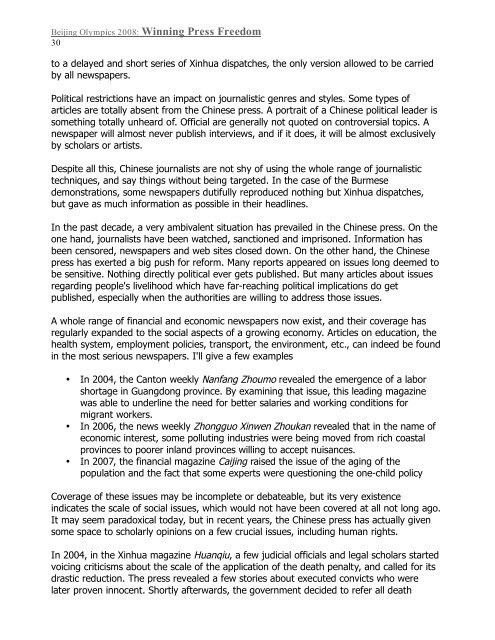Beijing Olympics 2008: Winning Press Freedom - World Press ...
Beijing Olympics 2008: Winning Press Freedom - World Press ...
Beijing Olympics 2008: Winning Press Freedom - World Press ...
You also want an ePaper? Increase the reach of your titles
YUMPU automatically turns print PDFs into web optimized ePapers that Google loves.
<strong>Beijing</strong> <strong>Olympics</strong> <strong>2008</strong>: <strong>Winning</strong> <strong>Press</strong> <strong>Freedom</strong><br />
30<br />
to a delayed and short series of Xinhua dispatches, the only version allowed to be carried<br />
by all newspapers.<br />
Political restrictions have an impact on journalistic genres and styles. Some types of<br />
articles are totally absent from the Chinese press. A portrait of a Chinese political leader is<br />
something totally unheard of. Official are generally not quoted on controversial topics. A<br />
newspaper will almost never publish interviews, and if it does, it will be almost exclusively<br />
by scholars or artists.<br />
Despite all this, Chinese journalists are not shy of using the whole range of journalistic<br />
techniques, and say things without being targeted. In the case of the Burmese<br />
demonstrations, some newspapers dutifully reproduced nothing but Xinhua dispatches,<br />
but gave as much information as possible in their headlines.<br />
In the past decade, a very ambivalent situation has prevailed in the Chinese press. On the<br />
one hand, journalists have been watched, sanctioned and imprisoned. Information has<br />
been censored, newspapers and web sites closed down. On the other hand, the Chinese<br />
press has exerted a big push for reform. Many reports appeared on issues long deemed to<br />
be sensitive. Nothing directly political ever gets published. But many articles about issues<br />
regarding people's livelihood which have far-reaching political implications do get<br />
published, especially when the authorities are willing to address those issues.<br />
A whole range of financial and economic newspapers now exist, and their coverage has<br />
regularly expanded to the social aspects of a growing economy. Articles on education, the<br />
health system, employment policies, transport, the environment, etc., can indeed be found<br />
in the most serious newspapers. I'll give a few examples<br />
• In 2004, the Canton weekly Nanfang Zhoumo revealed the emergence of a labor<br />
shortage in Guangdong province. By examining that issue, this leading magazine<br />
was able to underline the need for better salaries and working conditions for<br />
migrant workers.<br />
• In 2006, the news weekly Zhongguo Xinwen Zhoukan revealed that in the name of<br />
economic interest, some polluting industries were being moved from rich coastal<br />
provinces to poorer inland provinces willing to accept nuisances.<br />
• In 2007, the financial magazine Caijing raised the issue of the aging of the<br />
population and the fact that some experts were questioning the one-child policy<br />
Coverage of these issues may be incomplete or debateable, but its very existence<br />
indicates the scale of social issues, which would not have been covered at all not long ago.<br />
It may seem paradoxical today, but in recent years, the Chinese press has actually given<br />
some space to scholarly opinions on a few crucial issues, including human rights.<br />
In 2004, in the Xinhua magazine Huanqiu, a few judicial officials and legal scholars started<br />
voicing criticisms about the scale of the application of the death penalty, and called for its<br />
drastic reduction. The press revealed a few stories about executed convicts who were<br />
later proven innocent. Shortly afterwards, the government decided to refer all death





